Global Protests Condemn Death Sentences In Iran
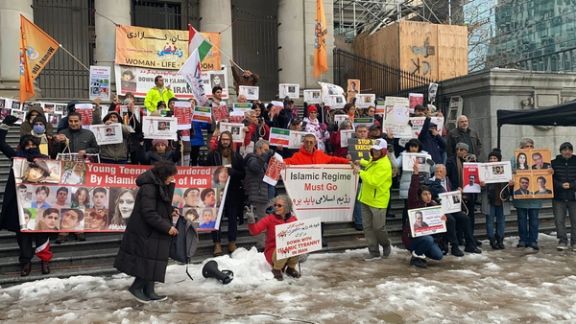
Iranians in 14 countries demonstrated as part of the "No to Execution" global campaign this weekend, against rising death sentences in Iran.

Iranians in 14 countries demonstrated as part of the "No to Execution" global campaign this weekend, against rising death sentences in Iran.
On Saturday, Iranians in Sweden, Canada, Germany, the United States, the United Kingdom, France, Austria, Belgium, Italy, Denmark, the Netherlands, Australia, Finland, and Iraq organized protests.
In Canada, Iranian residents in cities such as Toronto, Vancouver, Montreal, Ottawa, Quebec City, and Calgary braved extreme cold temperatures to voice their opposition to the death sentences.
Demonstrators conveyed their protest by displaying photos of those condemned to death with one hand and holding a symbolic rope in the other.
The global campaign, spanning from January 13 to 20, saw participation from over 100 groups, political parties, and more than 800 Iranian and non-Iranian activists.
Beyond the demonstrations, participants engaged in discussions with authorities in respective countries concerning the ongoing executions in Iran.
According to a report by the US-based Human Rights Activists News Agency (HRANA) on Thursday, at least 12 prisoners in Iran, charged with political or security-related offenses, currently face death sentences.
The political prisoners, held in Tehran, Karaj, Ahvaz, Kermanshah, and Zahedan prisons, have been condemned to execution by the revolutionary and criminal courts of the Islamic Republic's judiciary.
Charges such as "moharebeh" (waging war against God), corruption on earth, membership in opposition parties, and collaboration with foreign states are among the accusations that have led to the imposition of death sentences for the inmates.
Last year hundreds of political prisoners, protesters and those charged with drug offenses were executed as executions reached record numbers.
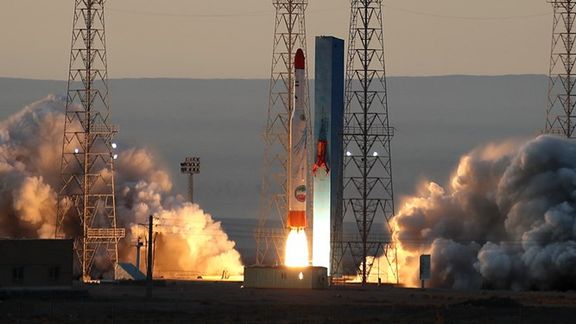
Iran announced Saturday a ‘new record’ satellite launch as part of its space program that many fear could be a cover for the regime to expand it ballistic missile program.
Official Iranian news agencies published images of a rocket blasting off, claiming that it carried and placed a homemade satellite to an orbit 750 kilometers above earth.
The announcement –not yet verified independently– comes days after Iran’s Revolutionary Guards (IRGC) used ballistic missiles to hit targets in three neighboring countries, and on the same day its proxies launched several ballistic missiles at a US base in Iraq.
The US military said, “most of the missiles were intercepted by the base’s air defense systems while others impacted on the base.” At least one Iraqi soldier was wounded in the attack and several US troops had to be examined for “traumatic brain injuries,” according to the US Central Command.
IRGC-affiliated media on Sunday morning focused on the news of "possible brain injuries" to US troops, amid a wave of popular sentiments on Persian social media about Israel's successes in eliminating senior IRGC officers in targeted strikes.
Iran insists that its satellite launches are for communications purposes, but many see the regime’s ‘space program’ as part of its missile program, especially since both are driven and governed by the IRGC.
A recent US intelligence assessment suggested that launching satellites “shortens the timeline” for Iran to develop an intercontinental ballistic missile. It is all the more worrying, experts say, since Iran is on the verge of nuclear capability, according to most intelligence estimates and recent International Atomic Energy Agency reports.
Earlier this week, the IAEA director general said Iran has enough enriched uranium to make “several” nuclear weapons, and it faces no “technical obstacle” to do so.
The US government maintains that Iran’s satellite launches are in contravention of the United Nations Security Council Resoluton 2231, that formalized the 2014 JCPOA nuclear agreement. Nevertheless, the Biden administration allowed UN other UN restrictions related to Iran’s ballistic missile program to expire in October 2023, ignoring calls for its renewal.
Biden critics say his Iran policy has been too soft and has emboldened the regime and its regional proxies to attack US interests.
“Exactly three years into the Biden Admin’s “clear-eyed hard-nosed diplomacy” with Iran, the regime is firing 15 ballistic missiles at our bases in Iraq,” former US state department advisor on Iran Gabriel Noronha posted on X. “And he didn’t get Soleimani for it either.”
Last week, just after he authorized airstrikes on Iran-backed Houthis in Yemen, Biden said “I've already delivered the message to Iran. They know not to do anything.” Since then, the Houthis have carried out more attacks in the Red Sea, including on a US warship, and armed groups supported by Iran have launched more missiles against US forces in Iraq.
Biden has admitted that the airstrikes against the Houthis have failed to stop their attacks on ships in the Red Sea.
A report in the Washington Post Sunday suggests that after ten days of “unsuccessful” airstrikes, the administration may soon opt for a “large-scale sustained military operation” against the Houthis.
That could bring the US one step closer to a direct confrontation with Iran, first because Houthi operations are directed by IRGC commanders, according to Reuters quoting Iranian and regional sources, and second because if it fails, the Biden administration might be left with no choice but to consider targeting IRGC directly.
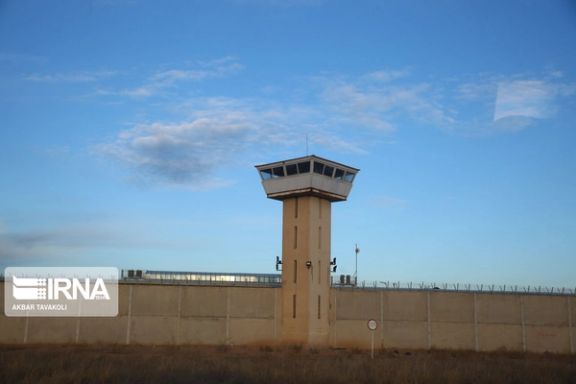
Over 2,300 teachers and citizens in Iran have expressed concern for the well-being of two teachers currently held in Adelabad Prison in Shiraz.
Iraj Rahnama and Gholamreza Gholami, serving as teachers in Fars Province, have embarked on a hunger strike since January 13 to protest the sentences handed down to them.
They were sentenced to five and eleven years in prison, respectively, by Branch 37 of the Fars Province Appeals Court in December.
In addition to their prison terms, they received "supplementary penalties," including a two-year travel ban resulting in passport cancellation and a two-year ban on online activities.
Furthermore, Gholami has been subjected to an additional penalty of two years of exile in Birjand, northeast of Iran.
The statement said, "The physical and age-related conditions of the two prisoners, combined with the substantial and irreversible risks of their hunger strike, have deeply worried their families, fellow activists, and the entire community."
In recent decades, numerous political prisoners in Iran, especially those undertaking hunger strikes in protest, have faced various health issues and serious injuries, with some losing their lives.
While the government's longstanding history of pressure and efforts to suppress teachers and activists persist over the past two decades, recent years have witnessed a significant surge in the detention of teachers and the imposition of severe prison sentences upon them.
For years, Iranian educators have been advocating for increased salaries and pensions, being among the lowest-paid segments of government employees. Additionally, they have voiced their opposition to the poisoning of schoolgirls, a crisis that emerged in Iran last year, impacting numerous educational institutions and affecting thousands of students.
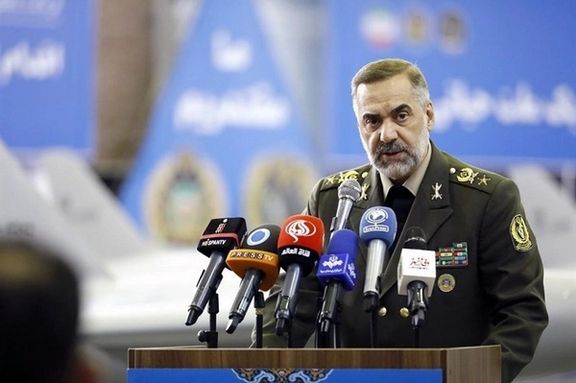
Iranian Defense Minister Mohammad-Reza Ashtiani cited international law on Saturday to justify IRGC’s recent missile strikes on targets in Iraq and Pakistan.
Under all international laws, any country attacked by terrorists can defend itself legitimately, Ashtiani said, adding that “we can respond to threats from any country, anywhere.”
He claimed that the Islamic Republic had informed neighboring countries about anti-Iran threats before the recent IRGC attacks. If we see that our neighbors do not act to contain the threats, we will use our “legitimate right” and carry out operations, Ashtiani warned.
He stressed that despite the IRGC’s attacks, Iran respects all its neighbors and recognizes their territorial integrity.
On January 15 and 16, the IRGC attacked several positions in Iraq’ Kurdistan region, Syria and Pakistan in what it called was an attempt to target terrorists and Israeli agents. Pakistan retaliated by attacking locations in southeastern Iran early Thursday.
Iran’s Foreign Minister, Hossein Amir-Abdollahian, has also defended the attacks, saying they were carried out “in line with combating terrorism and legitimate self-defense.”
“We have no reservations when it comes to securing our national interest with any other country,” he warned.
IRGC missiles hit a civilian house in Erbil belonging to Peshraw Dizayee, killing him and 4 members of his family. Dizayee was a business mogul and head of Falcon Investment Group. Following the raid, IRNA, the Iranian state news agency, accused Dizayee of collaborating with Israel.
In a statement issued on Friday, the Erbil Chamber of Commerce urged citizens and business owners in Iraq’ Kurdistan to boycott Iranian goods in protest to the Islamic Republic’s missile attack.
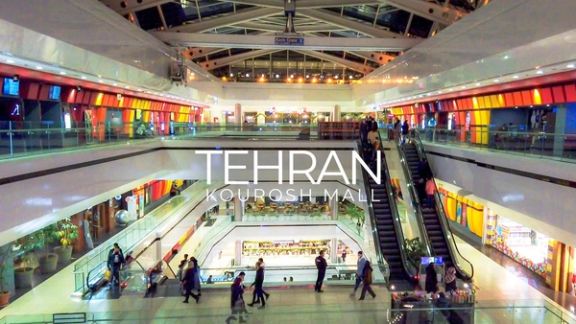
In the aftermath of a government crackdown on Kurosh Mall in the western part of Tehran, shop owners have made the decision to shutter their businesses.
Reports suggest that authorities seized merchandise from stores, citing concerns related to smuggling and mandated that all items must be of exclusive Iranian origin, with no presence of recognizable foreign brands.
Social media users view the operation as another move by the clerical regime to tighten financial constraints on the public amid a severe budget deficit.
Iran is currently contending with a considerable infrastructure deficit amounting to $500 billion. The government's operating budget also faces a 50-percent deficit.
The economic challenges in Iran have deepened since the United States withdrew from the JCPOA nuclear accord in 2018 and imposed sanctions. However, the roots of Iran's economic struggles extend further, as the Islamic regime has failed to allocate its substantial oil export revenues towards adequate infrastructure and investments since the 1990s. Despite generating around $1.5 trillion from oil sales over the past two decades, the government now finds itself controlling over 80% of the economy and facing bankruptcy.
Constrained by US oil export sanctions, Iran sells crude at discounted rates to China, earning approximately $30 billion annually, with no significant revenues in hard currencies. The amount falls short of covering the government's annual budget, leaving no funds for essential long-term investments.
While some commentators in Iran, including certain regime politicians, attribute the current economic challenges to President Ebrahim Raisi's administration, this perspective often neglects the impact of the country's foreign policy, typically influenced by Supreme Leader Ali Khamenei.
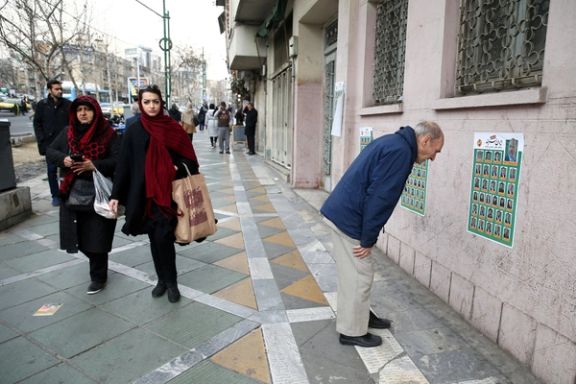
Less than 45 days before Iran's parliamentary elections, it appears that only a small segment of the reform camp is likely to take part in the restricted competition.
The interior ministry and the Guardian Council that vet candidates, have disqualified almost all so-called reformist and moderate candidates, paving the way for ultraconservatives to win a majority.
The left wing of reformist parties, including the Unity of Nation party, still insist that the restrictive policies of hardliners makes competition almost impossible. However, some conservatives, including Hamid-Reza Taraghi, a member of the Central Council of the conservative Islamic Coalition Party claims that reformists will present a full list of their candidates for the March 1 elections.
Like most regime politicians who have little if any idea of what a fair political competition means, Taraghi says that anyone or any group that seeks a share of political power is opposed to the formation of a strong parliament.

Nonetheless, his argument about reformists coming to the scene with full lists may carry some truth as Javad Heravi, the Spokesman for the Moderation and Development Party, which is close to former President Hassan Rouhani, told the press on Monday that the party will not venture into the elections without a full list of candidates. The party had announced earlier that it might nominate only 16 candidates for the 30 seats in Tehran as not enough of its members have been approved by the government to run for parliament.
Heravi added that there is no point in continuing consultations with the predominantly conservative supervisory institutions that vet the candidates. He said: "We had some 200 candidates but many of them have been disqualified and we have less than 100 candidates left." He added, "The ruling minority in Iran is saying very clearly that they do not want a high turnout in the elections."
He also said that his party might form a coalition with other likeminded groups to present a list of 30 candidates for Tehran and a full list for other constituencies. The Moderation and Development Party and another centrist party, the Executives of Construction, appear to be the only pro-reform parties that are keen to take part in the elections.
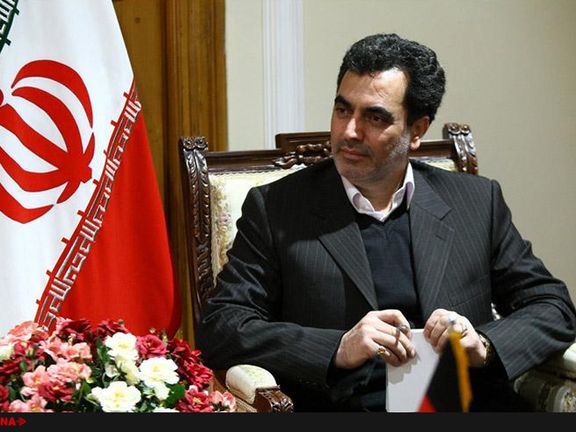
Meanwhile, Esmail Gerami-Moghaddam, the spokesman for the reformist National Trust Party stated that although many of its members had registered their candidacy, the number of those whose qualifications have been endorsed by the Guardian Council is so small that the party is not able to nominate any candidates in 90 percent of constituencies. He emphasized that nearly all of the candidates whose qualifications have been endorsed belong to conservative parties.
Meanwhile, conservative politician Amir-Reza Vaez-Ashtiani argued that "Reformists know they do not have grassroot support. Radicals among them, including jailed former Deputy Interior Minister Mostafa Tajzadeh, and reformist theoretician Saeed Hajjarian are now part of the opposition." However, he said, "Moderates are different. They still believe in the revolution [Islamic Republic]."
In another development, reformist politician Gholamreza Ansari said that the Unity of Nation has a voters' base and its members are active all over Iran, but its leaders have brought the reform camp on the verge of dissolution, hoping that in this way this party standing alone can win more votes from among reform-minded voters.
Despite the arguments on both sides, it is not clear if the reform camp is really divided, or it is the government and its conservative supporters who are trying to portray it as a divided group. What is clear is the seasonal nature of all political parties in Iran that are absent for almost three and half years and become active only during the parliamentary or presidential elections.